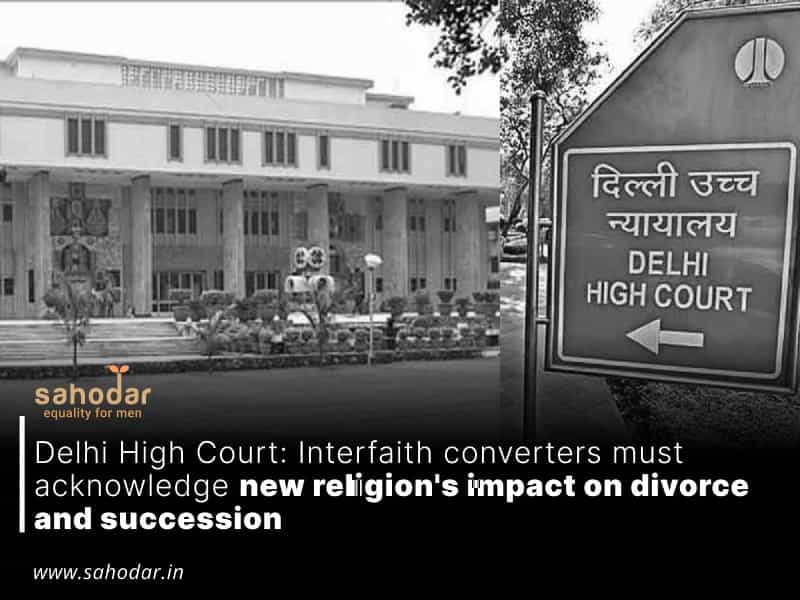The Court said that the person who is converting to another faith must be explained the tenets, rituals, and expectations inherent in religious conversion.
On Friday, the Delhi High Court ruled that individuals changing their religion for marriage with someone from another faith must submit an affidavit declaring their understanding of the consequences and implications of the new religion concerning divorce, custody, succession, and religious rights (Maksood Ahmad v State of NCT of Delhi & Anr).
The Court, in response, issued comprehensive guidelines for authorities handling interfaith marriages post-conversion and for recording statements of sexual assault victims under Section 164 of the Criminal Procedure Code (CrPC).
According to the judgment, a certificate accompanying the conversion certificate should affirm that the convert has received explanations about the tenets, rituals, and expectations associated with religious conversion, along with understanding the implications and consequences concerning marital divorce, succession, custody, and religious rights.
Furthermore, the Court mandated that the conversion and marriage certificates should be provided in an additional vernacular language comprehensible to the prospective convert, serving as evidence of their understanding.
“The same be in Hindi also where the language spoken and understood by the prospective convert is Hindi, in addition to any other language preferred to be used by such authority. Where the language spoken and understood by the prospective convert is other than Hindi, the said language can be used,” the Court said.
It was further emphasized that an affidavit, including details on age, marital history, and current marital status, along with supporting evidence, must be provided. The affidavit should explicitly state that the conversion is undertaken voluntarily, with a full understanding of the implications and consequences related to marital divorce, succession, custody, and religious rights.
Justice Swarana Kanta Sharma specified that these directives do not extend to individuals reverting to their original religion, as they are already familiar with their original faith.
The Court also clarified that these guidelines do not pertain to marriages conducted under the Special Marriage Act, 1954.
“These guidelines are for ensuring well-informed decision on the part of the naive, uneducated, susceptible, adolescent couples who may enter into such unions after conversions, without fully comprehending the profound implications of such a conversion, impact of which extends far beyond the immediate union, encompassing a myriad of consequences on their personal laws and various facets of life,” the Court said.
Brief Guidelines for Recording Section 164 CrPC Statements:
- The statement should not be mechanically recorded or in a typed format. It must be in the language understood by the victim.
- The victim should be presented before the magistrate promptly. Before recording, the Investigating Officer (IO) identifies the victim, and the magistrate notes when the IO exits after identification.
- The magistrate conducts preliminary inquiries to assess the victim’s competence, asking age-appropriate and educationally relevant questions.
- Questions reflect the victim’s state of mind, including awareness of surroundings, purpose of the statement, and reasons for making it.
- Inquiries affirm that the statement is voluntary, free from threat, pressure, fear, influence, coercion, or tutoring.
- For child victims, the magistrate ensures understanding of the sanctity of oath and may waive oath for tender age.
- Preliminary inquiries and statements must be in the vernacular and not in a typed, stereotyped form.
- The victim’s words are transcribed verbatim, describing the act without euphemisms to avoid contention during trial.
- The magistrate appends a certificate affirming the voluntary nature of the statement, its accuracy, and no additions or omissions.
- The certificate notes that the statement was read and explained to the victim, who signed or provided a thumb impression in the magistrate’s presence.
- If typed by a stenographer or interpreter (an exception), it’s added that it was done at the magistrate’s dictation, representing the true content.
The Court issued these guidelines while rejecting the request to quash an FIR against a man under Sections 376 (rape) and 506 (criminal intimidation) of the Indian Penal Code (IPC) despite the complainant and the accused marrying.
In the complaint, the woman claimed rape by Maksood Ahmad on September 24, 2022. The FIR was filed on October 18, 2022. Although the woman converted and married Ahmad on the same day, he was arrested on November 18, 2022.
While the woman asserted divorce from her first husband during marriage to Ahmad, the Court found no evidence. Ahmad was already married.
Despite their wish to quash the FIR due to being together, the Court noted the woman’s ineligibility for remarriage when marrying Ahmad. The Court emphasized that subsequent marriage does not automatically warrant FIR quashing in cases under Section 376 of IPC.
“This Court also looks such marriage with suspicion, and the bona fides of accused are also unclear, since the marriage in this case was immediately solemnized i.e. within a period of ten days of registration of FIR, after getting the religion of prosecutrix converted to Islam, and it cannot be ascertained at this stage as to whether the religious conversion in this case was with a bona fide intent to only marry the prosecutrix or to clandestinely project to the prosecutrix that now she was married to the accused and that both of them could now approach the Courts for seeking bail and for quashing of the FIR.”
Justice Sharma ultimately determined that quashing the proceedings would amount to allowing the abuse of the legal process by both parties.
“Thus, in view of the above facts and circumstances, this Court does not find it a fit case to quash the FIR,” the Court held.

